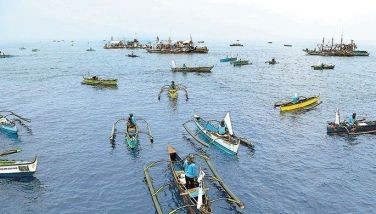Government hits call to repeal oil deregulation law

March 6, 2003 | 12:00am
Malacañang warned lawmakers yesterday against moves to repeal the Oil Deregulation Law of 1998, saying this would not help the country cope with rising oil prices caused by the crisis in the Middle East.
Energy Secretary Vincent Perez Jr. made the warning after House Deputy Minority Leader Enrique Garcia urged President Arroyo to certify as urgent a bill that would repeal the oil industry deregulation law, or Republic Act 8479, because of its supposed failure to control oligopolistic pricing practices in the oil industry.
"If Malacañang is serious, let’s go all the way. We can repeal it in two weeks’ time," Garcia said during the Fernandina Forum in Greenhills, San Juan.
But Perez insisted that RA 8479 even cushioned Filipino consumers from the full impact of the 286-percent cumulative increase in the price of Dubai crude since February 1999 when the law came into effect.
"Dubai prices have increased by 286 percent since February 1999, when the oil deregulation law began.
However, despite the peso depreciation, (the price of) diesel only increased by 101 percent and unleaded by 79 percent because of deregulation. The margins may (even) be squeezed," Perez said.
"Had we continued with a regulated oil industry, we could have seen pump prices increased by 286 percent," he added.
At the same time, Perez reiterated his opposition to a proposal to sell the government’s 40-percent share in Petron Corp., one of the three largest oil firms in the country.
Perez’s opposition to the sale was supported by Sen. Ralph Recto who said "there must be government presence in (the strategic oil) industry."
Aside from the looming war in the Middle East and the depreciation of the peso, Perez said the $3 to $6 increase in the current price of crude oil was also due to winter stockpiling and the ongoing strikes in oil-producing countries like Venezuela and Nigeria.
As of end-February, the price of Dubai crude has risen to $30.02 per barrel of 42 gallons, or 190.89 liters.
But National Security Adviser Roilo Golez, head of the government’s Iraq Crisis Management Team (ICMT), said the "immediate suspension" of RA 8479 remains an option for the government if rising oil prices cripple the transport sector and the economy.
But Golez stressed that the ICMT would only make such a recommendation with the advise of the Department of Energy (DOE).
DOE Undersecretary Benhur Salcedo, for his part, said "the present problem we are facing is not the supply but the volatility in the prices of petroleum products, particularly the pump prices of diesel and gasoline."
Salcedo had earlier said the country has an oil stockpile that would be sufficient until June.
Salcedo said the country’s oil inventory will be good for 76 days, up from last week’s stockpile of 68 days. He said 47 days worth of oil were already in the country while the balance is in transit.
The country has also secured commitments from Saudi Arabia, Russia, Malaysia and Iran that they would help ensure a sufficient and continuous supply of oil in the event of war in the Middle East. — With Rainier Allan Ronda, Perseus Echeminada, Jess Diaz
Energy Secretary Vincent Perez Jr. made the warning after House Deputy Minority Leader Enrique Garcia urged President Arroyo to certify as urgent a bill that would repeal the oil industry deregulation law, or Republic Act 8479, because of its supposed failure to control oligopolistic pricing practices in the oil industry.
"If Malacañang is serious, let’s go all the way. We can repeal it in two weeks’ time," Garcia said during the Fernandina Forum in Greenhills, San Juan.
But Perez insisted that RA 8479 even cushioned Filipino consumers from the full impact of the 286-percent cumulative increase in the price of Dubai crude since February 1999 when the law came into effect.
"Dubai prices have increased by 286 percent since February 1999, when the oil deregulation law began.
However, despite the peso depreciation, (the price of) diesel only increased by 101 percent and unleaded by 79 percent because of deregulation. The margins may (even) be squeezed," Perez said.
"Had we continued with a regulated oil industry, we could have seen pump prices increased by 286 percent," he added.
At the same time, Perez reiterated his opposition to a proposal to sell the government’s 40-percent share in Petron Corp., one of the three largest oil firms in the country.
Perez’s opposition to the sale was supported by Sen. Ralph Recto who said "there must be government presence in (the strategic oil) industry."
Aside from the looming war in the Middle East and the depreciation of the peso, Perez said the $3 to $6 increase in the current price of crude oil was also due to winter stockpiling and the ongoing strikes in oil-producing countries like Venezuela and Nigeria.
As of end-February, the price of Dubai crude has risen to $30.02 per barrel of 42 gallons, or 190.89 liters.
But Golez stressed that the ICMT would only make such a recommendation with the advise of the Department of Energy (DOE).
DOE Undersecretary Benhur Salcedo, for his part, said "the present problem we are facing is not the supply but the volatility in the prices of petroleum products, particularly the pump prices of diesel and gasoline."
Salcedo had earlier said the country has an oil stockpile that would be sufficient until June.
Salcedo said the country’s oil inventory will be good for 76 days, up from last week’s stockpile of 68 days. He said 47 days worth of oil were already in the country while the balance is in transit.
The country has also secured commitments from Saudi Arabia, Russia, Malaysia and Iran that they would help ensure a sufficient and continuous supply of oil in the event of war in the Middle East. — With Rainier Allan Ronda, Perseus Echeminada, Jess Diaz
BrandSpace Articles
<
>
- Latest
- Trending
Trending
Latest
Trending
Latest
Recommended

































